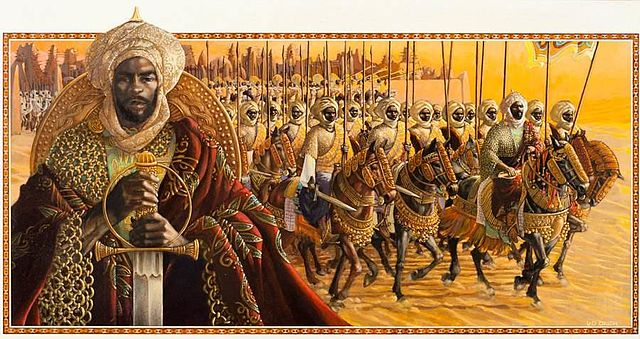Who is the richest man in history? In the annals of human civilization, the pursuit of wealth has been a driving force shaping the course of societies and empires. From legendary monarchs to modern magnates, individuals have risen to unprecedented heights of affluence, leaving an indelible mark on history through their vast riches and influence. Before the richest man in the worldor the richest people in the worldalive today, one question persists: who was the richest man in history?
Delving into the archives of time, we embark on a journey to uncover the identities and legacies of the individuals who amassed fortunes that transcended the bounds of their eras. Join us as we explore the lives, accomplishments, and economic empires of history’s wealthiest individuals, illuminating the timeless pursuit of prosperity that continues to captivate the imagination of humanity.
Mansa Musa: The Golden Emperor of Mali
Year: 1280–1337
Country: MaliWealth:
Richer than anyone could describe
In the 14th century, Mansa Musa, the ruler of the Mali Empire, reigned supreme as the wealthiest man of his time. His wealth was so immense that it defied description, as he embarked on a legendary pilgrimage to Mecca, lavishing gold upon his journey and leaving a lasting impression on the economies he encountered.
Augustus Caesar: Rome’s Imperial Purveyor of Prosperity
Lived: 63 BC–14 AD
Country: Rome
Wealth: $4.6 trillion
During the height of the Roman Empire, Augustus Caesar amassed a fortune estimated at $4.6 trillion in today’s currency. As the first Roman emperor, he wielded unprecedented economic power, presiding over an empire that spanned vast territories and enriched him beyond measure.
Emperor Shenzong: China’s Economic Colossus
Lived: 1048–1085
Country: China
Wealth: Ruled empire with 25% to 30% of global GDP
Emperor Shenzong of the Song Dynasty ruled China during the 11th century, commanding an empire that contributed 25% to 30% of the global GDP. His economic might established China as a dominant force in world trade, solidifying his place among history’s wealthiest individuals.
Akbar I: India’s Magnificent Monarch
Lived: 1542–1605
Country: India
Wealth: Ruled empire with 25% of global GDP
Akbar I, the Mughal Emperor of India, controlled an empire that accounted for 25% of the global GDP during the 16th century. His astute governance and economic policies propelled India to unprecedented prosperity, cementing his legacy as one of the richest men in history.
Joseph Stalin: The Soviet Union’s Authoritarian Arbiter
Lived: 1878–1953
Country: USSR
Wealth: Complete control of a nation with 9.6% of global GDP
Joseph Stalin, the totalitarian leader of the Soviet Union, wielded absolute control over a nation that comprised 9.6% of the global GDP. His iron-fisted rule consolidated economic power in the hands of the state, making him one of history’s wealthiest figures in terms of influence and control.
Andrew Carnegie: America’s Industrial Tycoon
Lived: 1835–1919
Country: United States
Wealth: $372 billion
In the late 19th and early 20th centuries, Andrew Carnegie emerged as one of America’s wealthiest individuals, amassing a fortune valued at $372 billion. Through his steel empire and philanthropic endeavors, Carnegie left an indelible mark on the landscape of American industry and philanthropy.
John D. Rockefeller: The Oil Baron’s Boundless Wealth
Lived: 1839–1937
Country: United States
Wealth: $341 billion
John D. Rockefeller, the founder of Standard Oil Company, amassed a fortune of $341 billion during the Gilded Age of America. His dominance in the oil industry reshaped the economic landscape, establishing him as one of history’s wealthiest and most influential figures.
Bernard Arnault: France’s Modern Magnate
Lived: 1949 – Present
Country: France
Wealth: $233B
According to Forbes’ Billionaires List for 2024, Bernard Arnault, the chairman and CEO of LVMH Moët Hennessy – Louis Vuitton SE, holds the title of the richest living person with a staggering wealth of $233 billion. Arnault’s empire spans luxury goods, fashion, and more, solidifying his status as a titan of modern capitalism.
Alan Rufus (a.k.a. Alan the Red): England’s Feudal Fortune
Lived: 1040–1093
Country: England
Wealth: $194 billion
Alan Rufus, also known as Alan the Red, amassed a fortune of $194 billion during the 11th century, making him one of the wealthiest men in medieval Europe. His vast land holdings and feudal power secured his position among history’s economic elites.
Genghis Khan: The Conqueror’s Conquest of Wealth
Lived: 1162-1227
Country: Mongolian Empire
Wealth: Lots of land, not much else
Genghis Khan, the legendary Mongolian conqueror, amassed vast territories across Asia during the 12th and 13th centuries. While his wealth was predominantly in land rather than liquid assets, his empire’s expanse solidified his place among history’s richest individuals, with control over vast swathes of territory and resources.
Who is the Richest Man in History?
Now that you know who is the richest man in history, from the opulent courts of ancient empires to the boardrooms of modern corporations, these ten titans of wealth have left an enduring legacy that continues to shape the course of human history. Their fortunes, amassed through conquest, commerce, and innovation, serve as a testament to the enduring pursuit of wealth throughout the ages.






